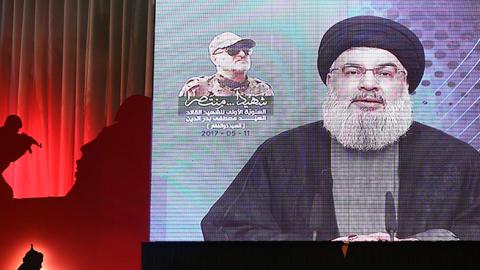Donald Trump called out Hezbollah at both stops on his Middle East trip last week. In Saudi Arabia he praised the Gulf Cooperation Council for designating the Iranian-backed Lebanese Shiite militia a terrorist organization and noted that Riyadh had placed sanctions on a senior Hezbollah figure. In Jerusalem Mr. Trump scored Hezbollah for launching rockets “into Israeli communities where schoolchildren have to be trained to hear the sirens and run to the bomb shelters—with fear, but with speed.”
The president and his national-security team must have taken a good look across Israel’s northern border. Lebanon is at a crossroads. Decisions the president makes now could help prevent a devastating war between Israel and Hezbollah. Such a war would severely damage Lebanon and could drag the U.S. into another complex and costly entanglement in the Middle East. Engagement today can prevent risks to American lives tomorrow.
Hezbollah is sponsored by Iran and has become increasingly brazen in the last decade. It is now more militarily powerful than most North Atlantic Treaty Organization members. It has 150,000 missiles and could launch 1,500 of them a day. From the ground, air or sea, it can strike anywhere in Israel. Lebanon’s president, Michel Aoun, hasn’t distanced the Lebanese army from Iran’s proxy. Rather, he has embraced it. “Hezbollah’s weapons do not contradict the national project,” he said in February, but are “a principal element of Lebanon’s defense.”
Yet when Hezbollah acts, it does so with Iran’s interests in mind—not Lebanon’s. Iran would have no qualms spilling Lebanese blood in a war with Israel. Just look at Syria, where under Iranian direction, the Assad regime has unleashed genocide against the Sunni Arab population using Hezbollah as its storm troops.
War between Israel and Lebanon is avoidable, but only if the world acts now—with American leadership. Hezbollah’s ability to destabilize the region stems from the abject failure of U.N. Security Council Resolution 1701 and the peacekeeping force tasked with enforcing it, the United Nations Interim Force in Lebanon, or Unifil.
Resolution 1701 was adopted unanimously after Israel was forced to fight a defensive war against Hezbollah in 2006. It mandated that Unifil keep southern Lebanon “free of any armed personnel, assets and weapons” and prevent the area from being used “for hostile activities of any kind.”
Like many U.N. resolutions, 1701 has been thoroughly ineffective. Hezbollah is 10 times as strong now as it was in 2006, and its military infrastructure permeates Lebanon. Yet Unifil claims ignorance of the terror organization’s arms buildup. Unifil’s March 2017 report reaches new heights of absurdity, even for a U.N. organization: “To date, Unifil has neither been provided with, nor found, evidence of an unauthorized transfer of arms into its area of operations.”
Hezbollah must not be allowed to impose war on the region and tragedy on Lebanon while the Iranian regime rubs its hands. What can Mr. Trump do?
The U.S. should seek a U.N. Security Council resolution amending 1701 and providing Unifil with explicit powers to disarm Hezbollah and demilitarize South Lebanon under Chapter 7 of the U.N. charter, the section that deals with peace enforcement. Currently Unifil derives its legal mandate from Chapter 6, which deals with peacekeeping. Peacekeeping helps local restaurants stay in business but does little to enforce peace.
As usual, the tab for U.N. failure in Lebanon is being paid by American taxpayers. The U.S. picks up 43% of Unifil’s $488 million annual budget. Congress should make that funding conditional on performance.
Now is the time to update Resolution 1701. War between Lebanon and Israel would be detrimental to Russian interests in Syria, so Vladimir Putin could be convinced to help rein in Hezbollah. For the Arab states, led by Saudi Arabia and Egypt, containing Hezbollah and Iran is a priority. Western Europe should be eager to avoid a war that would worsen its refugee crisis. Meanwhile, finding common ground over Lebanon and Syria could strengthen cooperation between Israel and the Sunni Arab states searching for a lasting solution to the Israeli-Palestinian problem.
President Trump and Secretary of State Rex Tillerson have a historic opportunity to do the right thing, at the right time, in the right place: to show that U.S. diplomatic intervention today can prevent the need to make terrible decisions about U.S. military intervention tomorrow.
















